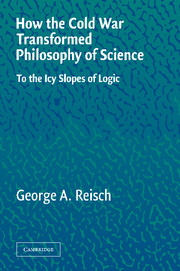Book contents
- Frontmatter
- Contents
- Preface and Acknowledgments
- 1 An Introduction to Logical Empiricism and the Unity of Science Movement in the Cold War
- 2 Otto Neurath, Charles Morris, Rudolf Carnap, and Philipp Frank: Political Philosophers of Science
- 3 Leftist Philosophy of Science in America and the Reception of Logical Empiricism in New York City
- 4 “Doomed in Advance to Defeat”? John Dewey on Reductionism, Values, and the International Encyclopedia of Unified Science
- 5 Red Philosophy of Science: Blumberg, Malisoff, Somerville, and Early Philosophy of Science
- 6 The View from the Left: Logical Empiricism and Radical Philosophers
- 7 The View from the Far Left: Logical Empiricism and Communist Philosophers
- 8 Postwar Disillusionment, Anti-Intellectualism, and the Values Debate
- 9 Horace Kallen's Attack on the Unity of Science
- 10 Creeping Totalitarianism, Creeping Scholasticism: Neurath, Frank, and the Trouble with Semantics
- 11 Frank's Neurathian Crusade: Science, Enlightenment, and Values
- 12 “A Very Fertile Field for Investigation”: Anticollectivism and Anticommunism in Popular and Academic Culture
- 13 Anticommunist Investigations, Loyalty Oaths, and the Wrath of Sidney Hook
- 14 Competing Programs for Postwar Philosophy of Science
- 15 Freedom Celebrated: The Professional Decline of Philipp Frank and the Unity of Science Movement
- 16 The Marginalization of Charles Morris
- 17 Values, Axioms, and the Icy Slopes of Logic
- 18 Professionalism, Power, and What Might Have Been
- References
- Index
3 - Leftist Philosophy of Science in America and the Reception of Logical Empiricism in New York City
Published online by Cambridge University Press: 21 January 2010
- Frontmatter
- Contents
- Preface and Acknowledgments
- 1 An Introduction to Logical Empiricism and the Unity of Science Movement in the Cold War
- 2 Otto Neurath, Charles Morris, Rudolf Carnap, and Philipp Frank: Political Philosophers of Science
- 3 Leftist Philosophy of Science in America and the Reception of Logical Empiricism in New York City
- 4 “Doomed in Advance to Defeat”? John Dewey on Reductionism, Values, and the International Encyclopedia of Unified Science
- 5 Red Philosophy of Science: Blumberg, Malisoff, Somerville, and Early Philosophy of Science
- 6 The View from the Left: Logical Empiricism and Radical Philosophers
- 7 The View from the Far Left: Logical Empiricism and Communist Philosophers
- 8 Postwar Disillusionment, Anti-Intellectualism, and the Values Debate
- 9 Horace Kallen's Attack on the Unity of Science
- 10 Creeping Totalitarianism, Creeping Scholasticism: Neurath, Frank, and the Trouble with Semantics
- 11 Frank's Neurathian Crusade: Science, Enlightenment, and Values
- 12 “A Very Fertile Field for Investigation”: Anticollectivism and Anticommunism in Popular and Academic Culture
- 13 Anticommunist Investigations, Loyalty Oaths, and the Wrath of Sidney Hook
- 14 Competing Programs for Postwar Philosophy of Science
- 15 Freedom Celebrated: The Professional Decline of Philipp Frank and the Unity of Science Movement
- 16 The Marginalization of Charles Morris
- 17 Values, Axioms, and the Icy Slopes of Logic
- 18 Professionalism, Power, and What Might Have Been
- References
- Index
Summary
A philosophy of science that aimed to be engaged in matters of politics and progressive social reform was not unique to the Vienna Circle and the Unity of Science movement in Europe. Prior to and simultaneous with the emigration of the movement to America in the 1930s, several different groups and camps of philosophers – both indigenous and exiled from Europe – pursued reformist and progressive programs that sought, as Engels famously wrote, not only to understand the world but to change it.
The purpose of this and the next three chapters is to survey the landscape of radical philosophy in 1930s America in order both to understand how logical empiricism and the Unity of Science movement were received in North America and to establish a context for understanding how left-leaning projects such as the Unity of Science movement came to be later rejected after the war by an academic establishment that had moved to the political right. In particular, because this landscape of the 1930s was inhabited at one extreme by philosophers who proudly and aggressively proclaimed that the kind of philosophy they practiced was communist, and because all things communist came to be openly persecuted in American society in the 1950s, this survey will help to identify some of the political baggage that later accrued to the Unity of Science movement by association or proximity.
- Type
- Chapter
- Information
- How the Cold War Transformed Philosophy of ScienceTo the Icy Slopes of Logic, pp. 57 - 82Publisher: Cambridge University PressPrint publication year: 2005



